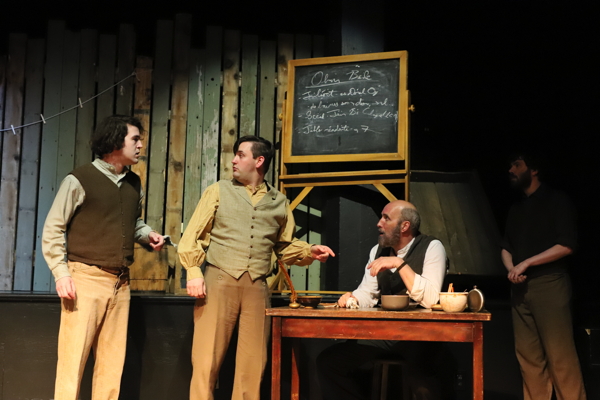
What’s in A Name? Everything for the characters in 'Translations', now at Black Mirror Theatre
By Jacob Juntunen
Brian Friel's 1980 play "Translations" is being revived by Black Mirror Theatre in an intimate and moving production through May 4. The script takes place in a small, 19th century Irish town and follows its residents as British soldiers survey the land and standardize -- that is to say, Anglicize -- the place names. Questions of politics, colonialism, and love are just under the surface of a hugely witty text that focuses on language.
The ten-person cast makes a wonderfully strong ensemble, and does great work together. In the first scene, Joseph Garner and Janine Norman immediately make the relationship between their two characters felt, which makes the end of the play all the more powerful. Similarly, Sean Michael and Maya Kelch give strong performances that provide great depth to their characters. But the acting that stayed with me the most is the scene between Carly Uding's portrayal of Maire and Jesse O'Freel's portrayal of Lieutenant Yolland. This scene comes late in the play, and I hesitate to go into too much detail for fear of giving away the plot, but suffice it to say that the tone and quality of the language require a deft touch from the actors. Uding and O'Freel are supremely up for the challenge.
Likewise, the director Madeline Finn provides an adroit feel of her own. Rather than weigh the play down in a heavy concept, Finn allows the play's language to take center stage. This choice permits the script to breathe, clarifies the play's literary allusions, and allows the show's clever uses of multiple tongues to work their magic on the audience. Perhaps there are moments when Finn's direction could have made more clear where to focus during large ensemble scenes. But the strength of Finn's direction over all is in her assembling a wonderfully talented ensemble of actors, and overseeing the assemblage of a versatile unit design.
The set by George Compas and director Madeline Finn is primarily a single location with two main levels, an abundance of wood texture both in the walls and props, and a proximity to the audience for us to feel that we are in the room with the characters. This intimacy is added to by the lights from Clare Fairbanks which can cast the room in the early morning comradery of the bottle or the stormy despair of a situation gone horribly wrong. Catherine Hopkins's sound design augments all these emotions. The costume design, which is not credited in the program, lives faithfully in this production's world of realism, down to period details such as several characters' lack of shoes. The design's one moment of heightened expressionism is all the more powerful for its singularity, which is again a testament to Finn's direction.
The play's discussion of the difficulties of Irish/English relations are also, unfortunately, as timely as ever, which the April 2019 killing of journalist Lyra McKee in Northern Ireland shows. It is thus a good time for "Translations" to be performed. That said, "Translation" is not an easy script. A production must contend with the script's many languages as well as its Irish and British accents, in addition to its formal and emotional challenges. Black Mirror handles all this with aplomb.


